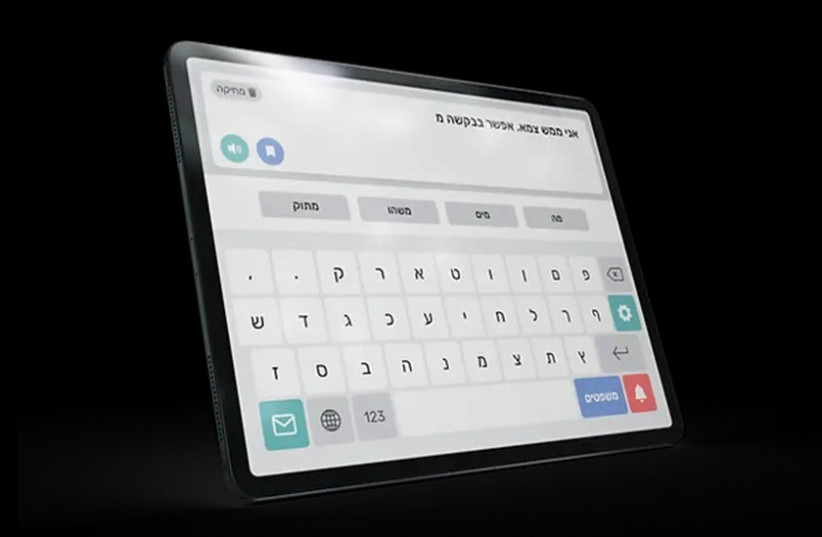IDF officer R suffered a severe head and limb wounds while serving on the northern border, from a missile attack. He was urgently transferred to Rambam Health Care Camus in Haifa for intensive treatment, with both of his legs completely crushed.
Despite his condition stabilizing, he remained in his bed with his head bandaged and his legs immobilized, unable to speak or write.
After several days of attempts by doctors to help him communicate using whiteboards and by having him point to letters using his only uninjured finger, it became apparent that something else was needed.
"We turned to [the medical nonprofit] Ezer Mizion, along with their assistive technology company, Hilma, which has had great success in developing technological aids for populations with special needs," said Dr. Maya Menachemi-Palkov, director of the Clinical Communication Service at Rambam, who also worked personally with the wounded soldier. "To our delight, [Ezer Mizion and Hilma] immediately worked to find the best solution for R. They ensured that he received a customized iPad with a system installed that is tailored to his needs, allowing him to begin communicating."
Finding solutions for wounded soldiers with brain injuries
With the outbreak of war with Hamas, there has been an increased need for the healthcare system and hospitals to be prepared to treat and rehabilitate soldiers suffering from severe head injuries. In addition to the natural difficulty of healing from these types of injuries, complexity is added in the form of an inability to communicate with the environment as a result of direct or secondary damage to the speech mechanisms of the brain. Now, a new application called Tagid Li (Tell me) assists injured individuals in effectively communicating with the medical team and their family members.

Tagid Li is a speech and expression support system for acute injury situations developed by Hilma in collaboration with Ezer Mitzion. The system allows patients who have lost their ability to speak due to physiological damage to communicate through typing and an automatic playback of the text. The new application is adapted and installed on iPads and tablets to provide maximum accessibility. The system allows users to type a sentence and hear it aloud, choose a sentence from a personalized built-in sentence database, send their words to family members or medical staff, and more.
The uniqueness of the new development lies in the fact that the system is accessible and flexible to adapt to the personal limitations of each patient. It can be quickly and easily customized by clicking and dragging on the touch screen, in contrast to existing communication systems that are more cumbersome to personalize. In addition, the injured person's family members can assist, shape, and input content into Tagid Li according to the patient's needs, without needing to rely on clinicians.
Another significant advantage is the affordability of the system. While other systems are only installed on a PC or an iPad with an iOS operating system, Tagid Li can also be installed on Android, which can be installed on much cheaper devices and the software itself is free of charge. This saves thousands of shekels for each patient. These differences make it accessible to everyone and significantly assist in the rehabilitation of the injured and their ability to communicate easily with their environment.
"Following the emergence of needs that arose from the field of hospitalization departments, we have developed a number of unique systems tailored to the needs of injured soldiers, with Tagid Li being one of them," said Michal Ofir, CEO of Hilma. "This is essentially an accessible keyboard that can speak on behalf of the injured person, predict words, store sentences for repeated use, and many other functions. This way, the injured person can communicate independently and quickly, seek help, express emotions, and regain a sense of control. As soon as we realized that the system could assist wounded soldiers, we activated a special team of volunteers from Hilma to tailor a response."
"The application is available on iOS and Android systems, can work offline in Hebrew, Arabic, and English," explains Yonit Hagual Karnieli, manager of the National Communication Support Center at Ezer Mitzion. "The application settings allow changes in text size, font, and different keyboard types, tailored to people with motor and visual difficulties. This is one of several applications that have been launched or are in development, and are part of the collaboration between the communication experts team of the National Communication Support Center at Ezer Mizion and Hilma that deals with social technological solutions."
How is IDF officer R doing now?
"When [R] arrived for treatment, he couldn't produce sound or eat through his mouth, and his legs were heavily bandaged," says Dr. Menachmi-Palkov. "The work with him focused on restoring his vocal and swallowing abilities, and expanding his communication abilities with his family and the [medical] team. The goal was to enable him to express his desires and maximize his independence through adapted supportive communication. Through Tagid Li, he managed to communicate with his family, as well as with the medical and treatment team. Through the rehabilitation process, he began to speak with his voice and eat through his mouth again."
Ofir adds that in these difficult and complex times, the IDF Rehabilitation Center is making efforts to develop innovative medical solutions. The Center is undertaking an intensive development process in order to provide technological support for challenges in the fields of health, well-being, and education that have intensified during wartime, and to provide assistance to the Israel's citizens during this time of need.
